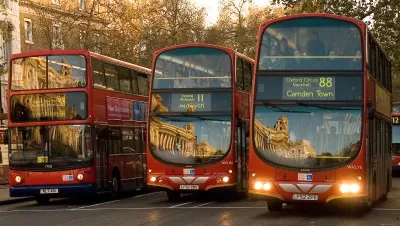Many cities in Europe are rediscovering their pre-automobile roots, using new technologies like ride-sharing and congestion pricing and old-fashioned ones like demolishing parking lots and dense development. Car ownership is dropping precipitously.

With their cozy streetscapes and mature public transit systems, European cities already have relatively low rates of automobile use. But that doesn't stop them from going big. Cities from Lyon to Birmingham to Munich are aggressively introducing programs and development patterns to make driving harder and car-sharing, walking, biking, and riding public transit easier.
“Sharing is the new paradigm of urban mobility. Tomorrow, you will judge a city according to what it is adding to sharing. The more that we have people sharing transportation modes, public space, information and new services, the more attractive the city will be.”
"'Multi-modal' and 'interconnectivity' are now the words on every urban planner’s lips. In Munich, says Bore, planners told him that the city dwellers of the future would no longer need cars. Bikes and more efficient public transport would be the norm; for occasional trips out of the city, they could hire a car or join a car club that facilitated inter-city travel. The statistic everyone trots out is that your car sits outside, idle and depreciating, for 96% of its life. There has to be a more efficient way to provide for the average of seven hours a week when you want it."
"The statistic (London neighborhood) Hackney is proudest of is that more than 15% of its residents commute to work by bike. “It’s about creating an environment where it’s easier for people to cycle or take the bus, so they’re not relying on cars,” Demirci says. Car ownership in the borough has dropped over the past 10 years: whereas a decade ago 56% of households did not own a car, that figure now stands at 65%."
FULL STORY: End of the car age: how cities are outgrowing the automobile

Study: Maui’s Plan to Convert Vacation Rentals to Long-Term Housing Could Cause Nearly $1 Billion Economic Loss
The plan would reduce visitor accommodation by 25,% resulting in 1,900 jobs lost.

Alabama: Trump Terminates Settlements for Black Communities Harmed By Raw Sewage
Trump deemed the landmark civil rights agreement “illegal DEI and environmental justice policy.”

North Texas Transit Leaders Tout Benefits of TOD for Growing Region
At a summit focused on transit-oriented development, policymakers discussed how North Texas’ expanded light rail system can serve as a tool for economic growth.

Paris Bike Boom Leads to Steep Drop in Air Pollution
The French city’s air quality has improved dramatically in the past 20 years, coinciding with a growth in cycling.

Why Housing Costs More to Build in California Than in Texas
Hard costs like labor and materials combined with ‘soft’ costs such as permitting make building in the San Francisco Bay Area almost three times as costly as in Texas cities.

San Diego County Sees a Rise in Urban Coyotes
San Diego County experiences a rise in urban coyotes, as sightings become prevalent throughout its urban neighbourhoods and surrounding areas.
Urban Design for Planners 1: Software Tools
This six-course series explores essential urban design concepts using open source software and equips planners with the tools they need to participate fully in the urban design process.
Planning for Universal Design
Learn the tools for implementing Universal Design in planning regulations.
Smith Gee Studio
Alamo Area Metropolitan Planning Organization
City of Santa Clarita
Institute for Housing and Urban Development Studies (IHS)
City of Grandview
Harvard GSD Executive Education
Toledo-Lucas County Plan Commissions
Salt Lake City
NYU Wagner Graduate School of Public Service



























